Look what they got! How can they fail? You’ve never seen a show like this before! They make the evening bright, and once you’re through tonight, they guarantee you’ll come back tomorrow for more! Toby’s Dinner Theatre of Columbia is setting sail up and down the Mississippi River with a grand old production of Show Boat. A rarely produced theatrical treasure, this musical theatre gem of yesteryore is an iconic foothold and earnest classic in the history of musical theatre. Directed by Mark Minnick and Toby Orenstein, with Musical Direction by Ross Scott Rawlings, this charming tale will captivate your mind from the moment the lights arise on the Cotton Blossom and keep you hanging onto these characters and their stories until the moment final bows are taken. Remarkably timeless, astonishingly sincere, and utterly delightful, Show Boat is making waves in Columbia and is the perfect production to kick off the 2017 year.
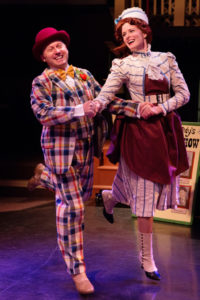
Welcome aboard the Cotton Blossom, for once you step through the lobby and into the theatre you’re traveling on board the finest riverboat the Mississippi ever did see just before the turn of the 20th century. Scenic and Lighting Designer David A. Hopkins makes full use of the space and transforms it into the majestic ship, giving the audience a fully immersive experience. The intimacy of the venue’s in-the-round staging plays into this concept and ingrains a sense of belonging to theatergoers as they watch the theatrical magic unfold all around them. The lattice work, painted tastefully in pastel red and green against bright white wood, is mighty grand; Hopkins even creates the illusion of the top of the riverboat by hanging it center stage. More impressive than the boat framework or even the extended stage featured for the scenes at the Trocadero, is Hopkins’ work with the lighting. His attention to detail, whether in the glowing bulbs under the ship’s lattice work, the drop-down lanterns in the ship’s kitchen, or honing in on the invention of electricity and brightening the lights in the time-stream accordingly, is exacting and gives the show a particularly polished and professional feel.
Rounding out this stellar aesthetic created by Hopkins, the costumes across the board are a smashing success. Provided by AT Jones & Company, the riverboat couture features some fancy frippery. Era appropriate and intent on cementing the differing roles each of the characters’ play, there is a wide assortment of tasteful and fashionable choices featured throughout the production. The pair with the wildest set of threads, however, seems to be the wise-cracking, fun-loving Vaudeville duo of Schultz & Schultz. With easily a half dozen outfits each, if not more, some of the zaniest costumes, all perfectly suited for the quick changing years that run through in the show’s second act, are featured on this delightful duo. Sparkles abound, patterns aplenty, the costumes in this production are as fine and dandy as the floating show of Cap’n Andy!
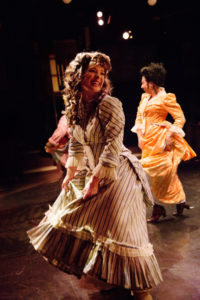
Directors Mark Minnick and Toby Orenstein has cultivated an astonishing production that radiates joy from every possible angle. Serving as a conduit to the modern generation, this directorial duo has revitalized a classic show and presented it with refreshing live, drawing the audience into this wondrous story. With Orenstein’s seasoned hand and Minnick’s strong understanding of modernity and relatability, the pair has fashioned a theatrical experience like no other that feels honest, entreats an audience to something magical, and maintains the integrity of its roots while still connecting strongly with today’s generation of theatergoers. The dramaturgical approach Minnick and Orenstein bring to the table is a resolute one, focusing on the show’s narrative and character development in equal parts to the singing and dancing of the show.
There is something to be said for a time-tested and historically cherished musical classic. Minnick and Orenstein have captured the essence of its historical importance and found a perfect balance for allowing the show, its characters and its narrative, to thrive with convivial heart, earnest enthusiasm, and proud passion. There is a delicate equilibrium that surfaces in their production, toeing the line of historical accuracy to the letter in a way which both serves the show and keeps audiences’ invested in the tale. Minnick and Orenstein set the bar high for the production and soar over it in every sense imaginable with songs and dances that defy description, emotional honesty developed soundly among the characters, and an overall production that is phenomenal.
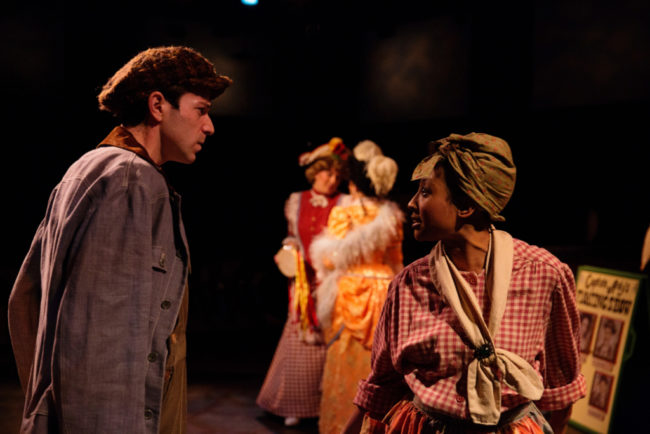
Minnick, who takes up the dual role of Choreographer, uses his seasoned hand to encourage a palpable ecstasy among the ensemble every time the music creates an opportunity for merriment. Exactingly appropriate for every year that passes, particularly when the transition of the 1920’s arrives, Minnick’s choreography not only represents each era accordingly but is the epitome of emotional expression when it comes to understanding the intention behind these numbers. Ragging up the steps that are featured in the dance breaks between 1899 and 1927, Minnick puts a determined dancing bug underfoot and inspires a contagious elation with all of these fast-footed routines. Using music and dance to heighten the experience of emotion, particularly the enjoyable feeling of glee as it radiates resplendently throughout the performance, Minnick’s caliber of choreography serves the show exceptionally well.
Musical Director Ross Scott Rawlings far surpasses expectations when it comes to musical bliss in this production. Leading the six-person live pit orchestra, from the well-concealed rafters of the riverboat, Rawlings delivers a lively orchestral arrangement that is alluring, appealing, and amazing to hear. Well-paced, and keeping up with the rigorous pacing that Minnick and Orenstein have set for the show as a whole, Rawlings moves the music with ease and fluidity and does so with unwavering consistency throughout the production. Finding the strong harmonious blends in the ensemble numbers, working rhythmic nuances in duets and solos, and polishing the musical elements of the production into a glossy masterpiece, Rawlings handles the classic with finesse and transforms it into pleasurable bliss for all who hear it.
Rawlings’ work with the ensemble, and in particular the Stevedores (Andre Hinds, DeCarlo Raspberry, Anwar Thomas) to provide stellar vocal support is impressive to say the least. Hinds, Raspberry, and Thomas— who also double up as dancing dandies in the second act under Minnick’s highly stylized choreographic instruction— put their voices to good use, providing a sturdy structure of vocal solidarity for Joe when he takes to his initial rendition of “Ol’ Man River.” Other numbers, like “Captain Andy’s Ballyhoo” and “Finale” feature Rawlings’ fine achievements with the ensemble, a veritable vocal showcase of strength, emotion, and glorious blending.
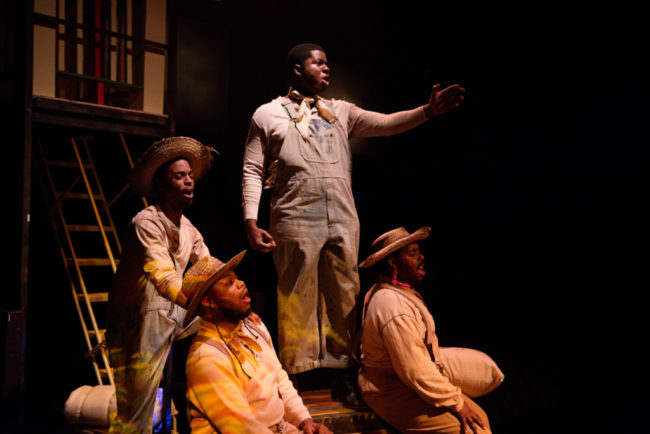
Character work is bountiful on the good ship Cotton Blossom! Displaying a deep dramaturgical bench, which soundly reflects a great deal of character development that is accordingly matched to perfection with the social, geographical, and entertainment climate of the era, performers all across the ensemble are exploding with noticeable nuances and detailed intricacy that truly makes the story a fascinating one. Ruthless rapscallion Pete (Jeremy Scott Blaustein) and Sheriff Vallon (David Bosley-Reynolds) catch the eye and ear early on with their southern river twang, with Blaustein’s being far more pronounced to show the disparity of social standing between the pair. Both men play unsavory sorts, with Blaustein getting to once again put his mark on a grody individual as he arrives to the showboat a few scenes later as a heightened caricature of a backwoodsman.
But the two individuals who steal the show with their brief burst of boisterous characterization are Lottie (Santina Maiolatesi) and Dottie (Coby Kay Callahan.) You won’t be able to miss these two dippy doodles as Maiolatesi and Callahan make the most out of their five minutes of fame with Cap’n Andy in the second act. An honest scream, Maiolatesi and Callahan put on hysterical airs and accents and make their goofy gals easy targets for good laughs.
Another fine ornament of the stage, Mister Justin Calhoun, takes up the role of Steven Baker in the first act. Strictly a romantic adornment for Miss Julia Lancione’s character, Julie LaVerne, Calhoun brings forth a staunch show of character in just one scene and that’s all it takes for the audience to fall in love with his noble ways, even if leading man Steven Baker never graces the stage after the intermission. Lancione traverses a tragic trajectory over the course of her character’s narrative, starting out sprightly and gay in the company of her fellow company members aboard the ship and even puts that spry energy into leading “Can’t Help Lovin’ Dat Man” before falling from grace into an embittered husk of her once former glory. The second act allows Lancione to readily showcase her character’s transition, though her vocal prowess is still fully in play. “Bill”, a tragically beautiful solo that fully embraces her emotional torment, is one of over a dozen deeply moving moments featured throughout the performance.
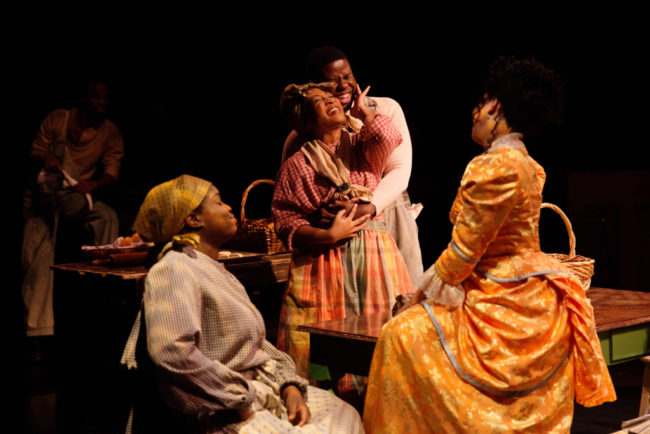
The entire production is bursting at the seams and threatening to flood the levy with glorious sound. But one of the most striking, deeply moving and fully satisfying sounds of the entire show is poured forth with earnest heart from Joe (Marquis White.) Drawing a tear to the eye and stirring to life an inexplicable tenderness in the soul when he starts singing the iconic “Ol’ Man River”, White delivers a hypnotic and mesmerizing rendition of the number that stretches deep into the basement of bass range. Flowing heavy with a raw honesty, every reprise swells up a little higher with emotional currents that will sweep you away and draw heartfelt sentimental tears to the eye. White takes every opportunity to present this classic number with the utmost sincerity and reverence, but this does not preclude him from the fun and joy happening throughout the production.
Paired off with Queenie (Samantha Deininger), the duo strikes up one of the most affectionately saccharine duets featured in the show. “I Still Suits Me” is a bundle of bickering and bantering but fully encapsulates the nature of their love for another, truly showcasing the deep bench of character development, which is experienced with great consistency from all the performers throughout the show. Deininger, as the sassy yet sincere Queenie, uses the aforementioned number to display her ferocious vocal prowess, going after Joe with a belt that could knock a man clean over the edges of the riverboat and soundly into next week! With an impressive vocal range, and emotionally expressive sound, Deininger explores a versatility inside Queenie and makes her a vibrant part of life inside the production. Firmly grasping the patois and nuances of speech for her character in accordance to the time and location of the play, Deininger delivers a praiseworthy performance from top to bottom. Matching White in her heavy deliver of “Mis’ry’s Comin’ Aroun’”, both it and its reprise, Deininger haunts the audience with something harrowing and beautiful in these two solo features, which shifts the overall atmospheric verve of the plot.
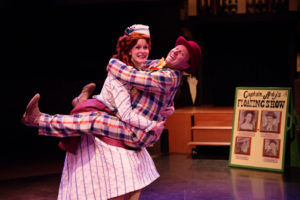
The epitome of wholesome family entertainment, the iconic pairing of character man and woman, Miss Ellie May Chipley (Elizabeth Rayca) and Mr. Frank Schultz (Jeffrey Shankle) may just be the finest example of character work combined with sensational song and dance skills the good old Cotton Blossom has ever seen! Rayca and Shankle are two perfect peas in a pod when it comes to performing as the romantically comedic duo. The pair have a keen understanding of balance, playing honestly and sincerely with one another and letting the comedy fall into place because of their earnest interactions. Cheeky and clever with one another, particularly when it comes to their quick quips and nippy exchanges, Rayca and Shankle lead the parade on honest comedy in the performance.
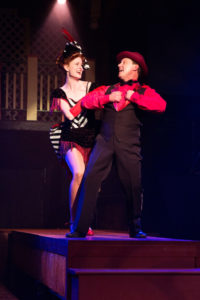
Both Rayca and Shankle have a strong handle on their characterizations of Ellie and Frank, embellishing these Vaudevillians with winning smiles, sprightly spirit, and a snazzy knack for song and dance. “Life Upon the Wicked Stage” is Rayca’s moment in the spotlight as she slips and dips her way through this number, enticing the gals of the ensemble with wild tales of her wonderful life as an actress. This number features exciting choreography and an infectious burst of joviality that stirs up the giggles and the glee quite soundly. Shankle, who gets to put his vivacious vocals and fancy footwork on display during “Goodbye My Lady Love”, is an honest character man, working the scenes with exacting balance to create real laughter without cheating to get there. Their cutely quarrelsome nature and real invested relationship carries their characters through at least a half-dozen extravagant costume changes, making them arguably the best dressed performers in the production.
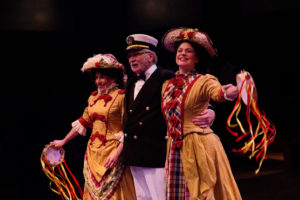
The tone of love that settles over Show Boat, which seems to be shared across all the major lasting couples, is that of a bickering and bantering nature. No truer is this expressed than by the ship’s leader, Captain Andy (Robert John Biedermann 125) and his darling wife Parthy (Jane C. Boyle.) Honest character work— some of the show’s finest— arrives in the relationship that Biedermann and Boyle have created between them. With Boyle constantly nattering on and on, nagging, nipping, and sniping at Biedermann’s character, there is an honest hilarity that accompanies their marriage, following it around like a cloud of laughter that might trail a wagon as its speeds through the dustbowl. Both Boyle and Biedermann have a particularly keen sense of comic timing and delivery, each knowing exactly when to step on one another’s toes, when to pause for effect, and how to handle one another in this boisterous situations. Biedermann, who Boyle’s character describes as great big bellowing catfish, lives up to the moniker particularly when fussing right back at her over the most absurd situations. The pair are delightful, simply put, and really carry the onus of the show’s maternal and paternal pride squarely and resolutely upon their shoulders.
The epitome of a gooey-eyed ingénue, washed afresh in innocence and naiveté, Magnolia Hawks (Abby Middleton) daughter of the aforementioned matriarchal and patriarchal figures, is winsome and sweet. Middleton’s operatic voice is sublime; her vocal experience provides an impressive contrast to the character’s nescience. Versatile when it comes to emotional transition, Middleton grows over the arch of her character’s trajectory, transforming from delicate blossom of her namesake into a radiant and resilient woman of heart and soul. Her heartbreaking “Can’t Help Lovin’ Dat Man (Reprise)” stirs the soul and tugs at the heartstrings, as all of her more melancholy numbers do throughout the production.
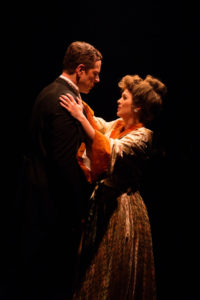
Paired off with Gaylord Ravenal (Russell Rinker), the pair fall head over heels in love at first sight, using the duet “Only Make Believe” to fully articulate this sentiment. Rinker’s robust voice is smooth like butter, rich like cream, and drips like honey over “Where’s the Mate for Me?” and later in “Only Make Believe” (Reprise) a duet shared briefly with his daughter Kim (Allie O’Donnell.) The dynamic relationship that Rinker shares with Middleton as their story weaves together from the midpoint of Act I through to the show’s finale is beyond compare in its earnest nature and reverent tone. The open interactions between them, from highs to lows and everything in-between carves their story into the broader tablet of the show and has the audience leaning in closely, desperate to see what happens. Both Rinker and Middleton are remarkably expressive of voice, both when singing and speaking with one another, and create honest characters that serve the show valiantly.
Better ask Ol’ Man River what he thinks about Toby’s Show Boat; he knows all about everything. And he knows that you better step aboard The Cotton Blossom and see this fine theatrical offering that Cap’n Andy and the whole Toby’s crew is offering to your fair community. Show Boat is setting sail and won’t stay in the harbor long! Don’t miss this golden opportunity to connect with a genuine revitalized staple of American musical theatre! Don’t let this Show Boat pass you by!
Running Time: 2 hours and 40 minutes with one intermission
Show Boat plays through March 19, 2017 at at Toby’s the Dinner Theatre of Columbia— 5900 Symphony Woods Road in Columbia, MD. For tickets please call (410) 730-8311 or purchase them online.

